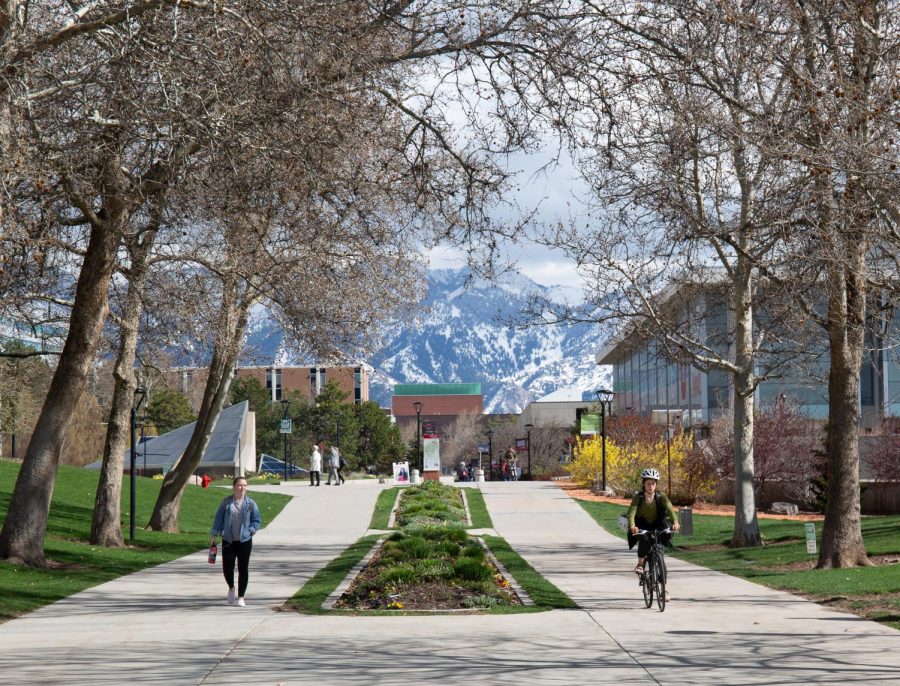Paying Tuition While Being Paid in Experience
January 26, 2022
Every year, University of Utah students participate in internship programs through the many channels the U provides, and graduate students become teaching assistants as part of their path towards higher education. However, for both interns and teaching assistants, compensation varies, and can look like an hourly wage, a tuition benefit or simply the work experience.
The U’s Career and Professional Development Center is one resource on campus for students looking to find internships and learn more about the job search process.
“We help with every stage of development, starting with career exploration, so helping students understand their unique strengths and skills, and how that might relate to a career in the future,” said Mary Arola, assistant director of marketing for the CPDC.
According to Arola, the CPDC works with students up to two years after graduation with building resumes, preparing for interviews, understanding how to negotiate salaries and other logistical aspects of finding an internship or job.
“We are working on developing an unpaid internship fund because we have found that’s a challenge for a lot of students, especially within nonprofit and government sectors. There’s just not always the financial ability of those organizations to pay interns, but we feel it’s really important for students to have funding to pay for their life and fund all the living expenses,” Arola said.
While there is no date yet for when this fund might be available to students, Arola said the center works to find creative ways of providing “internship” experience whether that be through adding a project to a current paid job or even taking on a smaller “micro-internship” that allows students to keep part or full-time jobs during those internships.
“One of the things we require for internships that are posted on our online job board is that they have to have specific learning objectives tied to them,” Arola said.
For Arola, whether an internship is paid or unpaid, any experience gained from participating in one is valuable, especially when it comes to earning skills transferable to other jobs.
However, one concern for the center is unpaid internships excluding certain student populations, such as those unable to a afford working 20 hours per week with no monetary compensation.
“There are particular populations that maybe are low-income, so students that are not able to take an unpaid internship, [such as] historically marginalized student groups and identities,” Arola said. “So … a big concern for us is that a lot of those students may have an interest in gaining experience in those areas, but it’s just not accessible for them at this point.”
For teaching assistants at the U, the process is a little different. To become a TA, students need to pass a training program in order to be eligible to teach. While almost every department has TA programs, it is typically graduate students who fill those roles.
“Teaching assistants are paid out of tuition money, but also they get a tuition waiver out of it,” said Dean of the Graduate School David Kieda. “If they’re paid $8,000 in a semester, then they’re eligible to get their tuition waived due to the tuition benefits program.”
According to Kieda, TAs are an important resource for undergraduates.
“We try to do our best to train them, especially
to make sure they’re going to do a great job in the undergraduate classes,” Kieda said. “So the quality of our undergraduate classes depends really heavily on the quality of our graduate students.”
Some international graduate students have trouble getting access to proper funding or receiving enough of a living wage.
“At the University of Utah, I think you can make a minimum of like $18,000 [which is] increased [from previous amounts]. That’s been really good because it’s really hard to live off of $15,000 a year,” said Kelsey Carlston, a Ph.D. student in the economics department. “We have a lot of foreign students who are coming in and they don’t see their family for years because they can’t afford to fly back home.”
Carlston completed her undergraduate education at Virginia Tech and has only had paid internships in the past. According to Carlston, both were good resume builders and experience for jobs after college.
“I don’t think that there are a lot of places that are not paying enough because they’re trying to take advantage of people,” Carlston said. “I think it’s that they have very few resources that they’re trying to get to go around and so while it is very privileged to be able to take an unpaid internship, […] I don’t know that if it’s that easy to change.”








